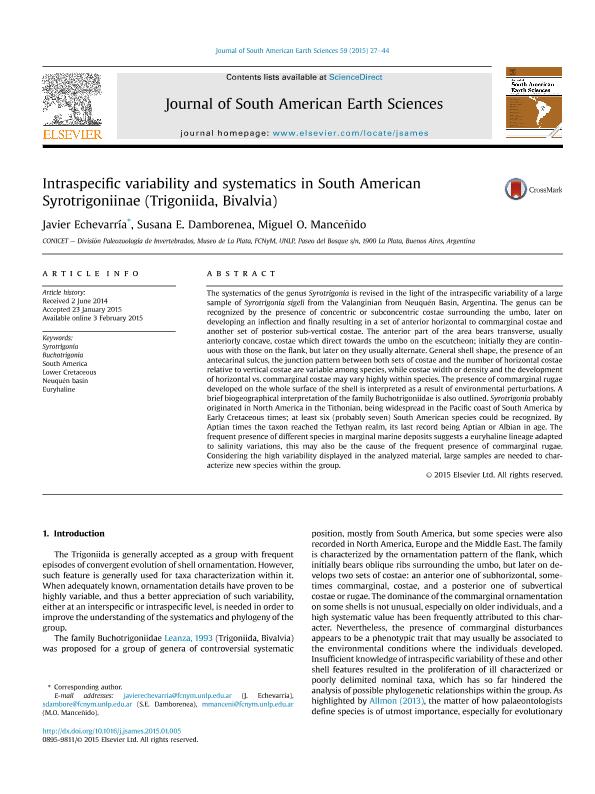Mostrar el registro sencillo del ítem
dc.contributor.author
Echevarría, Javier

dc.contributor.author
Damborenea, Susana Ester

dc.contributor.author
Manceñido, Miguel Oscar

dc.date.available
2021-04-14T11:58:44Z
dc.date.issued
2015-04
dc.identifier.citation
Echevarría, Javier; Damborenea, Susana Ester; Manceñido, Miguel Oscar; Intraspecific variability and systematics in South American Syrotrigoniinae (Trigoniida, Bivalvia); Pergamon-Elsevier Science Ltd; Journal of South American Earth Sciences; 59; 4-2015; 27-44
dc.identifier.issn
0895-9811
dc.identifier.uri
http://hdl.handle.net/11336/130001
dc.description.abstract
The systematics of the genus Syrotrigonia is revised in the light of the intraspecific variability of a large sample of Syrotrigonia sigeli from the Valanginian from Neuquén Basin, Argentina. The genus can be recognized by the presence of concentric or subconcentric costae surrounding the umbo, later on developing an inflection and finally resulting in a set of anterior horizontal to commarginal costae and another set of posterior sub-vertical costae. The anterior part of the area bears transverse, usually anteriorly concave, costae which direct towards the umbo on the escutcheon; initially they are continuous with those on the flank, but later on they usually alternate. General shell shape, the presence of an antecarinal sulcus, the junction pattern between both sets of costae and the number of horizontal costae relative to vertical costae are variable among species, while costae width or density and the development of horizontal vs. commarginal costae may vary highly within species. The presence of commarginal rugae developed on the whole surface of the shell is interpreted as a result of environmental perturbations. A brief biogeographical interpretation of the family Buchotrigoniidae is also outlined. Syrotrigonia probably originated in North America in the Tithonian, being widespread in the Pacific coast of South America by Early Cretaceous times; at least six (probably seven) South American species could be recognized. By Aptian times the taxon reached the Tethyan realm, its last record being Aptian or Albian in age. The frequent presence of different species in marginal marine deposits suggests a euryhaline lineage adapted to salinity variations, this may also be the cause of the frequent presence of commarginal rugae. Considering the high variability displayed in the analyzed material, large samples are needed to characterize new species within the group.
dc.format
application/pdf
dc.language.iso
eng
dc.publisher
Pergamon-Elsevier Science Ltd

dc.rights
info:eu-repo/semantics/openAccess
dc.rights.uri
https://creativecommons.org/licenses/by-nc-sa/2.5/ar/
dc.subject
BUCHOTRIGONIA
dc.subject
EURYHALINE
dc.subject
LOWER CRETACEOUS
dc.subject
NEUQUÉN BASIN
dc.subject
SOUTH AMERICA
dc.subject
SYROTRIGONIA
dc.subject.classification
Paleontología

dc.subject.classification
Ciencias de la Tierra y relacionadas con el Medio Ambiente

dc.subject.classification
CIENCIAS NATURALES Y EXACTAS

dc.title
Intraspecific variability and systematics in South American Syrotrigoniinae (Trigoniida, Bivalvia)
dc.type
info:eu-repo/semantics/article
dc.type
info:ar-repo/semantics/artículo
dc.type
info:eu-repo/semantics/publishedVersion
dc.date.updated
2021-04-12T16:21:45Z
dc.journal.volume
59
dc.journal.pagination
27-44
dc.journal.pais
Estados Unidos

dc.description.fil
Fil: Echevarría, Javier. Consejo Nacional de Investigaciones Científicas y Técnicas. Centro Científico Tecnológico Conicet - La Plata; Argentina. Universidad Nacional de La Plata. Facultad de Ciencias Naturales y Museo. División Paleozoología Invertebrados; Argentina
dc.description.fil
Fil: Damborenea, Susana Ester. Universidad Nacional de La Plata. Facultad de Ciencias Naturales y Museo. División Paleozoología Invertebrados; Argentina. Consejo Nacional de Investigaciones Científicas y Técnicas. Centro Científico Tecnológico Conicet - La Plata; Argentina
dc.description.fil
Fil: Manceñido, Miguel Oscar. Universidad Nacional de La Plata. Facultad de Ciencias Naturales y Museo. División Paleozoología Invertebrados; Argentina. Consejo Nacional de Investigaciones Científicas y Técnicas. Centro Científico Tecnológico Conicet - La Plata; Argentina
dc.journal.title
Journal of South American Earth Sciences

dc.relation.alternativeid
info:eu-repo/semantics/altIdentifier/doi/http://dx.doi.org/10.1016/j.jsames.2015.01.005
dc.relation.alternativeid
info:eu-repo/semantics/altIdentifier/url/https://www.sciencedirect.com/science/article/abs/pii/S0895981115000139?via%3Dihub
Archivos asociados
